Excavation Contractors Torton
Find top Excavation Companies in Torton
Get multiple Land Excavation quotes for your project today! Compare profiles, reviews, accreditations, portfolio, etc... and choose the best deal.

LOPES EXCAVATION AND HARDSCAPE INC
97 Hartford Ave East, Mendon, 01756, GBAbout Us Lopes Excavation and Hardscape Inc. is a family-owned and operated business serving the Mendon, MA area. We are committed to providing our clients with high-quality services at competitive prices. We have a team of experienced professionals who are dedicated to providing you with the best possible service. We are fully licensed and insured, and we are committed to safety and quality in all of our work. We are proud to serve our community and we are committed to providing our clients with the best possible experience. We offer a wide range of services, including: Excavation Site Work Demolition Foundations Drains Septic Systems Hardscape Hammering and Ledge Removal We are committed to providing our clients with the best possible service. We are fully licensed and insured, and we are committed to safety and quality in all of our work. We are proud to serve our community and we are committed to providing our clients with the best possible experience.
- Services
- Why Us?
- Gallery
Get Quote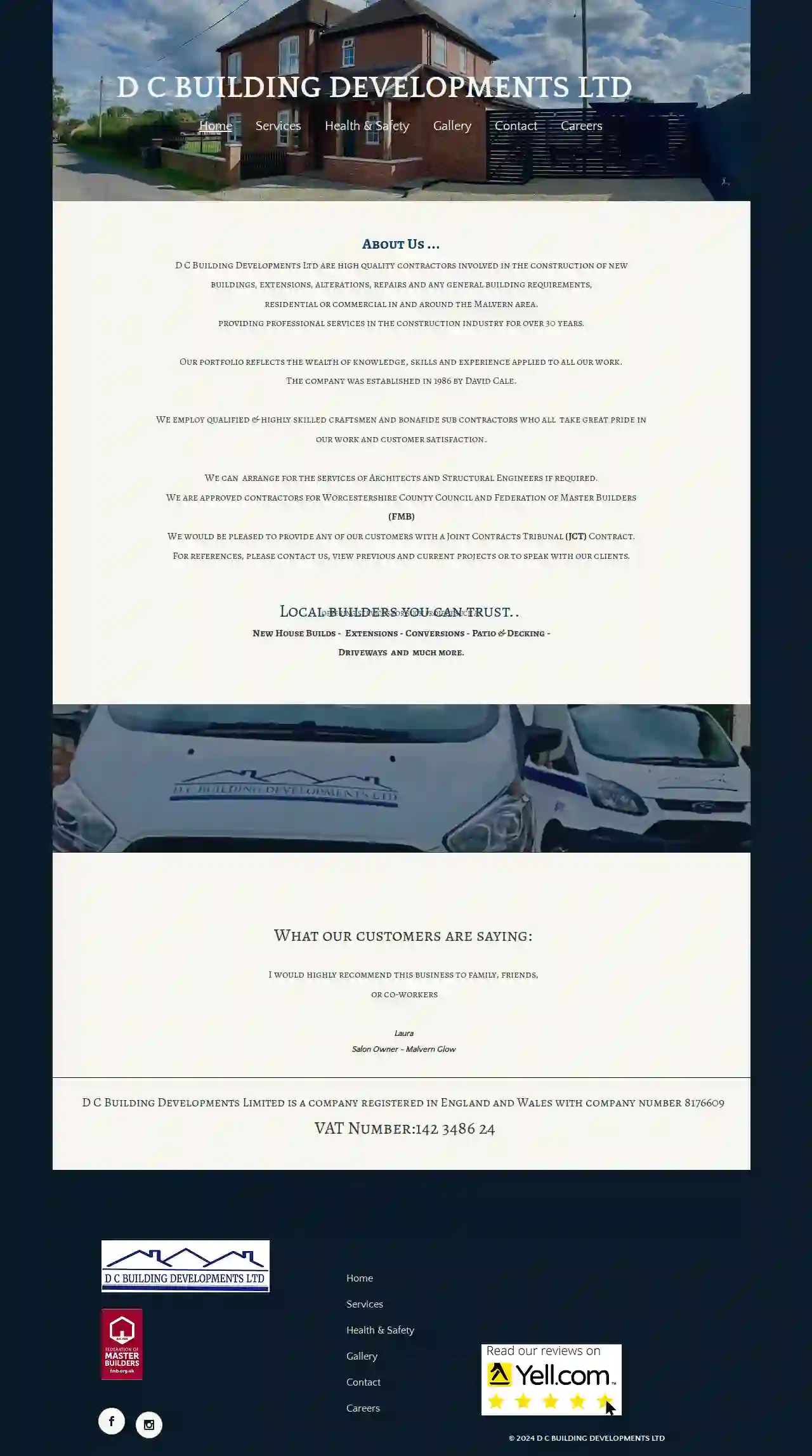
D C Building Developments Ltd
52 reviews35 Hawthorn Lane, Malvern Worcestershire, 35 Hawthorn Lane Malvern Worcestershire, Malvern, WR14 3LA, GBAbout D C Building Developments Ltd D C Building Developments Ltd are high-quality contractors specializing in the construction of new buildings, extensions, alterations, repairs, and any general building requirements, both residential and commercial, in and around the Malvern area. With over 30 years of experience in the construction industry, our portfolio showcases the wealth of knowledge, skills, and experience we bring to every project. Established in 1986 by David Cale, we are committed to delivering exceptional results. Our team of qualified and highly skilled craftsmen and bonafide subcontractors take immense pride in their work and customer satisfaction. We are approved contractors for Worcestershire County Council and the Federation of Master Builders (FMB), ensuring adherence to the highest industry standards. We can arrange for the services of Architects and Structural Engineers if required. We are happy to provide any of our customers with a Joint Contracts Tribunal (JCT) Contract. For references, please contact us, view previous and current projects, or speak with our clients. We are a company registered in England and Wales with company number 8176609. Our VAT Number is 142 3486 24.
- Services
- Why Us?
- Testimonials
- Gallery
Get Quote
ARMADILLO HARDSCAPE & EXCAVATION
Franklin, GBAbout Us We are a small business specialized in helping customers increase the value and beauty of their homes by creating elegant outdoor living spaces. With over 15 years of experience in the field, Fabrício loves to work building beautiful designed landscapes to satisfy all needs, from demo and preparations to full installations. He has you covered! Here are some of the different services we can help you with:
- Services
- Why Us?
- Our Team
- Gallery
Get Quote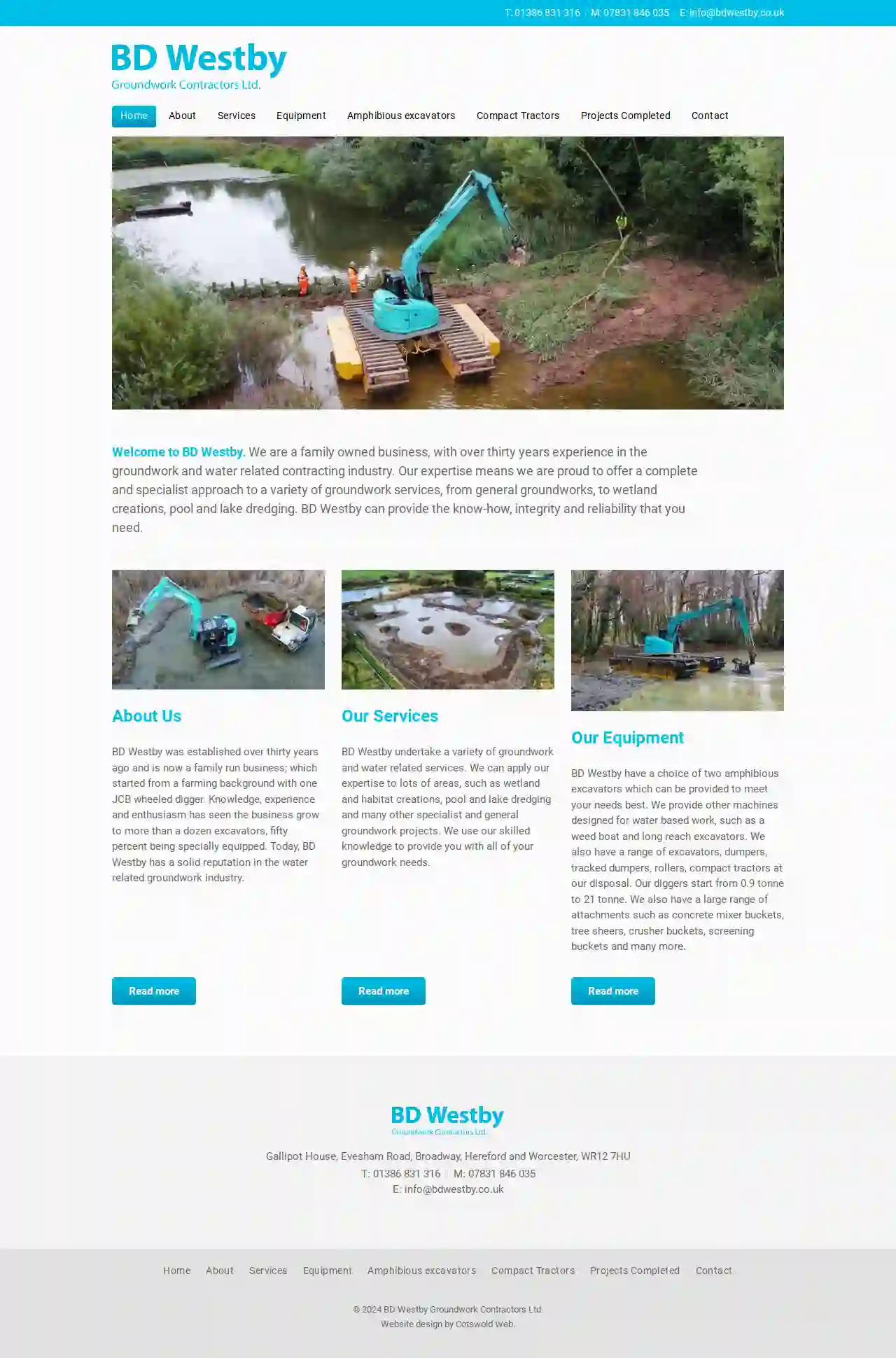
BD Westby Groundwork Contractors Ltd
Gallipot House, Evesham Road, Broadway, Hereford and Worcester, WR12 7HU, GBAbout BD Westby BD Westby is a family-owned business with over thirty years of experience in the groundwork and water-related contracting industry. We pride ourselves on offering a complete and specialist approach to a variety of groundwork services, from general groundworks to wetland creations, pool and lake dredging. BD Westby provides the know-how, integrity, and reliability you need. BD Westby was established over thirty years ago and is now a family-run business; which started from a farming background with one JCB wheeled digger. Knowledge, experience, and enthusiasm have seen the business grow to more than a dozen excavators, fifty percent being specially equipped. Today, BD Westby has a solid reputation in the water-related groundwork industry. With a wide range of rollers, dumpers, and attachments, our diggers start from 0.9 ton to 21 ton, with some being equipped with amphibious undercarriages, low ground pressure tracks, and tiltrotators, this provides us with the tools you need to get the job done. We only hire machinery with operators, meaning you get an assured and expert service wherever you are. BD Westby covers a large area, having completed projects all around the UK with operated plant or contracting services. We also specialize in the unusual – offering a truly groundbreaking groundwork service, no matter what.
- Services
- Why Us?
- Gallery
Get Quote
Oracle Construction
1000 Worcester Rd, Framingham, 01776, GBOracle Construction has been specializing in general, commercial excavation and sitework. We strive to complete projects on time with a focus on customer satisfaction and employee retention. We are able to bid and handle small to large projects based upon scope of work, complexity and schedule. We are fully insured with general liability and worker's compensation and are available to meet with you in your office or job site to discuss your projects specific needs. Oracle Construction is an industry leader in delivering reliable, premier property maintenance services throughout Massachusetts & Rhode Island. We offer services for all seasons, providing trusted care to all our clients. We’ll work with you to develop a property maintenance program to fit your needs and budget. We are a General Contracting firm, specializing in commercial and residential construction and facilities management services. Our mission is to provide our clients with a quality project, on time and within budget. We coordinate with our clients from the very conception of the project through completion. We work closely with our clients and Designers and Subcontractors based on our clients’ needs and vision. Our reputation has made us the contractor of choice in Massachusetts. Oracle Construction Company is based out of Metro West Massachusetts. We contract with private parties, commercial companies and government agencies. We are a licensed and insured general contractor that practices safe working practices while complying with demanding project time frames. We work hard to earn your trust and ultimately we want to grow with you as “Your Partner From the Ground Up.”
- Services
- Why Us?
- Gallery
Get Quote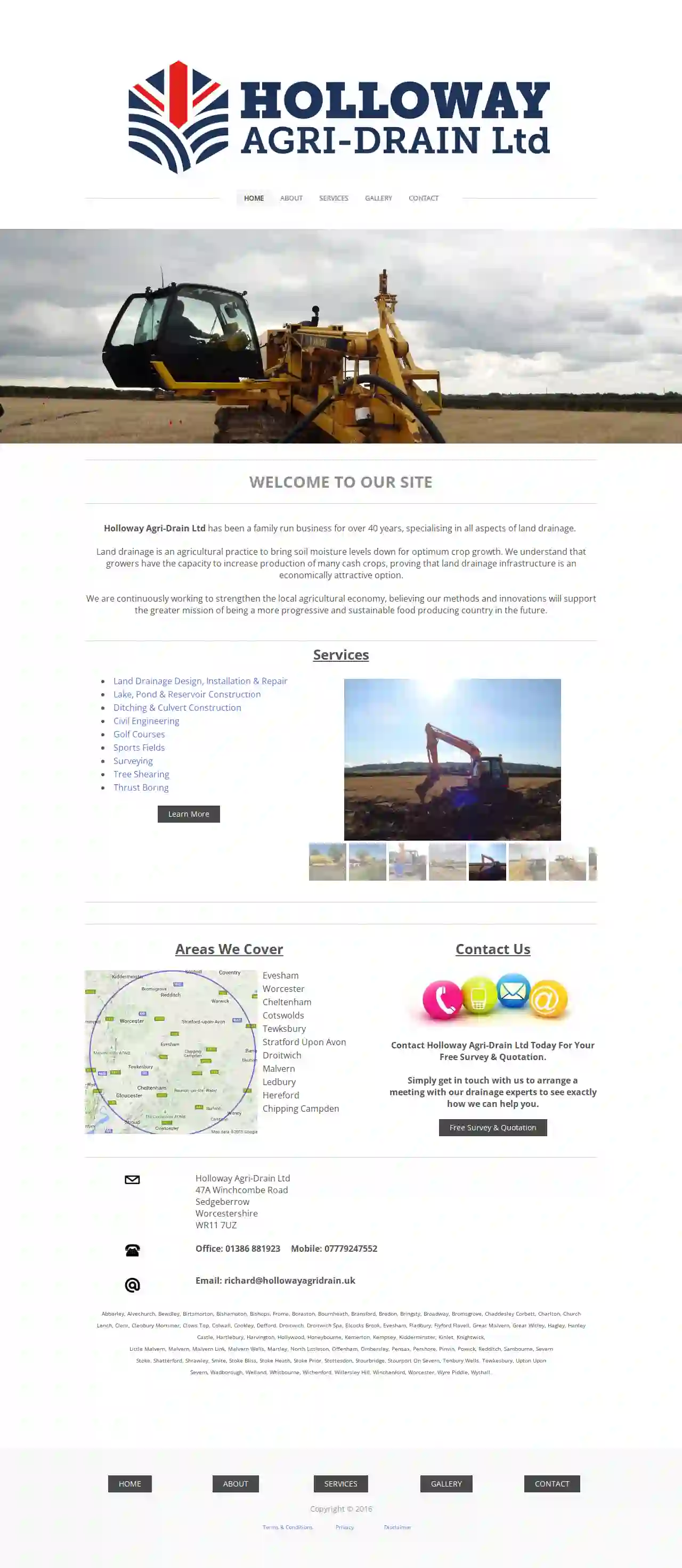
Roger Holloway & Sons
51 reviews47A Winchcombe Road, Sedgeberrow, Evesham, Worcs, WR11 7UZ, GBHolloway Agri-Drain Ltd: Over 40 Years of Expertise in Land Drainage Holloway Agri-Drain Ltd is a family-run business with over 40 years of experience specializing in all aspects of land drainage. We understand the importance of optimal soil moisture levels for successful crop growth and are committed to helping growers increase their production. Our dedication to strengthening the local agricultural economy drives us to continuously innovate and implement methods that support a more sustainable and progressive food production system in the UK. We believe in providing our clients with the highest quality service and are proud to offer a free survey and quotation for all projects. Our team of drainage experts is dedicated to providing personalized solutions that meet your specific needs.
- Services
- Why Us?
- Testimonials
- Gallery
Get Quote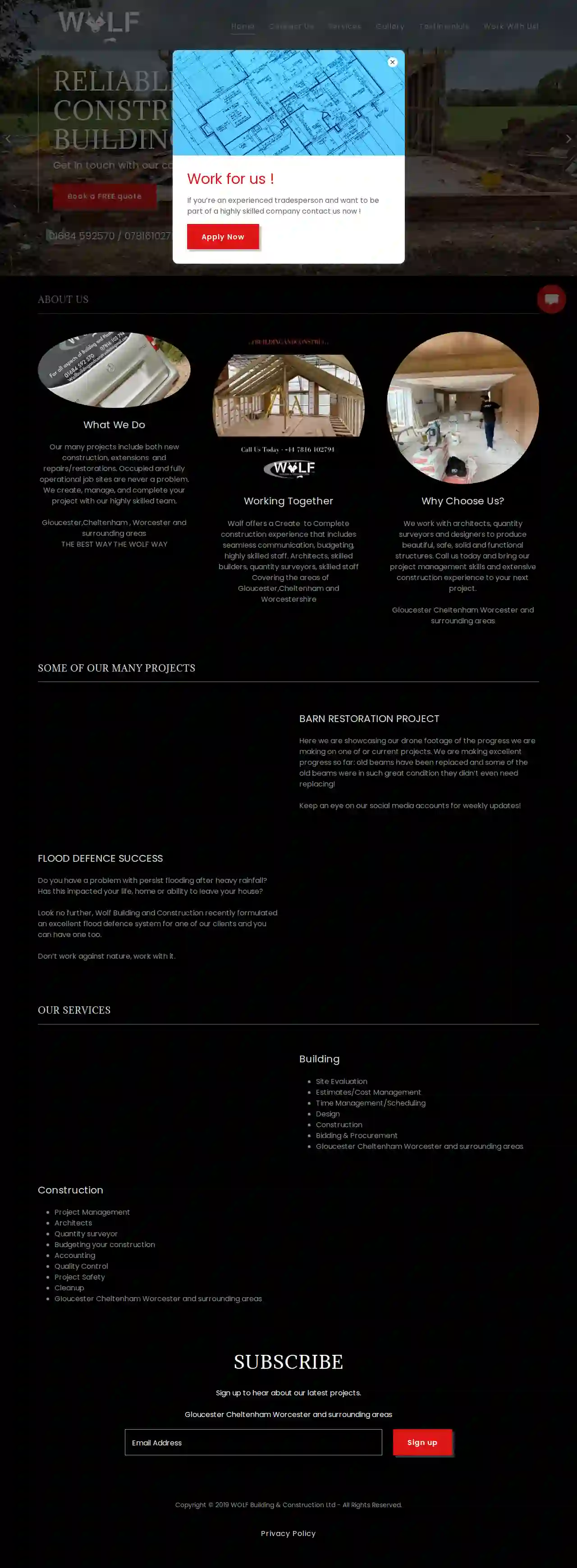
Wolf Building and Construction
32 reviewsPenny Royal, Baughton, Earls Croome, Worcestershire, WR8 9DQ, GBAbout Us Wolf Building & Construction Ltd is a reliable and safe construction company serving Gloucester, Cheltenham, Worcester and surrounding areas. We specialize in new construction, extensions, repairs, and restorations. Our team of highly skilled professionals is dedicated to creating, managing, and completing your project to the highest standards. What We Do We offer a comprehensive construction experience that includes seamless communication, budgeting, and highly skilled staff. Our team includes architects, skilled builders, quantity surveyors, and designers, ensuring that your project is completed to your exact specifications. Why Choose Us? We work closely with our clients to understand their needs and vision. We are committed to providing exceptional customer service and delivering projects on time and within budget. Our extensive construction experience and project management skills ensure that your project is completed to the highest standards.
- Services
- Why Us?
- Testimonials
- Gallery
Get Quote
W Maggs Construction
52 reviewsBadsey Hall, 42 High St, Evesham, WR11 7EJ, GBW MAGGS CONSTRUCTION, WORCESTERSHIRE We are a specialist construction company and have a trusted team of tradesmen with expertise in renovations, extensions or new builds for both domestic and commercial buildings. Our team can complete your job from digging the footings to fitting the curtain poles. We use our own electricians and plumbers so that you don’t have to worry about any stage of the job as we have it covered. WHAT WE DO W MAGGS Construction has the ability to take your project from the very inception all the way to completion, managing all aspects and all trades so you only have to deal with one person. Alternatively should you require only a single trade from us such as plastering, bricklaying or carpentry then we would also be delighted to discuss your project with you.
- Services
- Why Us?
- Gallery
Get Quote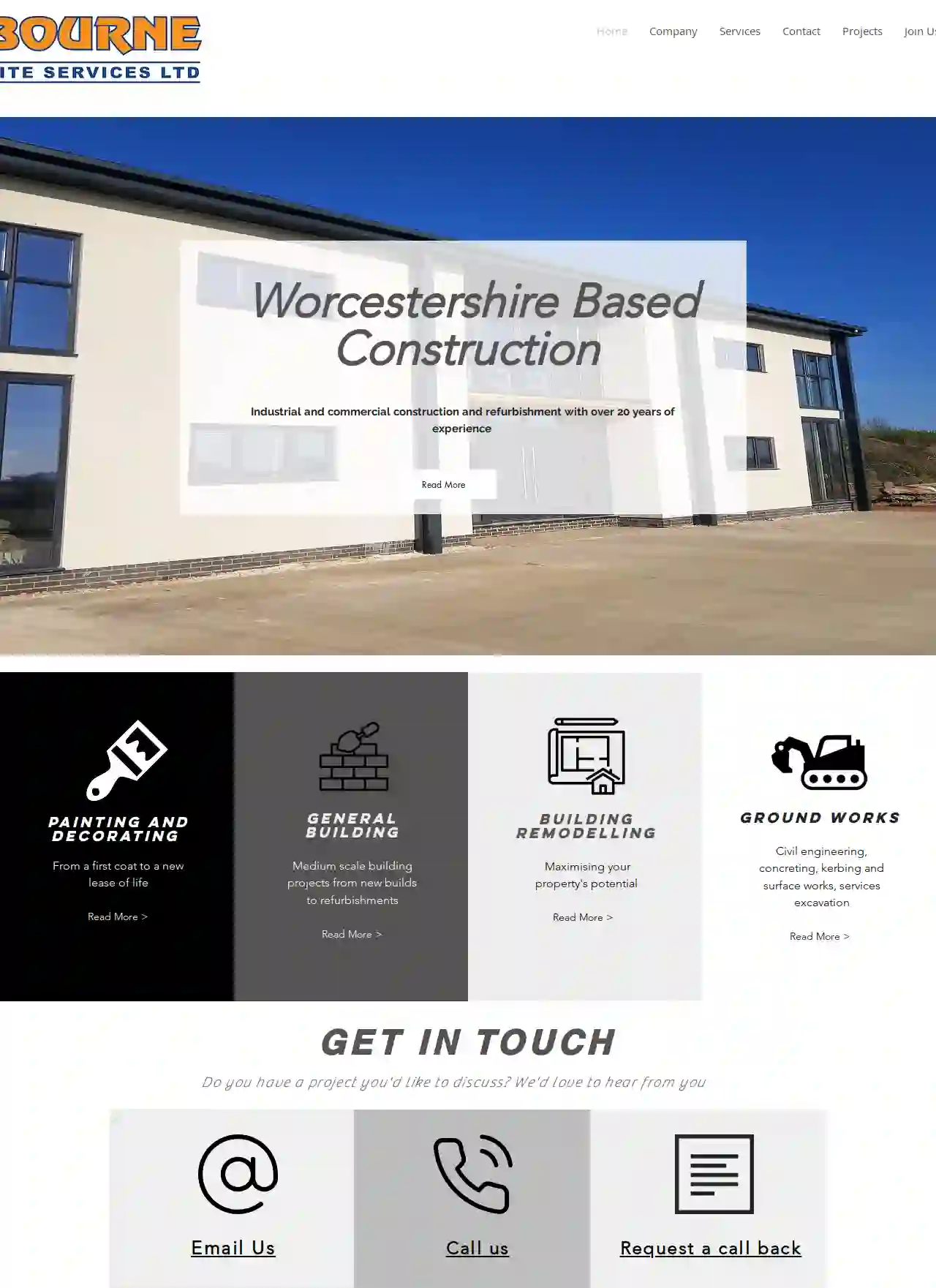
Bourne Site Services
32 reviewsWorcester, GBWorcestershire Based Construction Bourne Site Services is a Worcestershire based construction company with over 20 years of experience in industrial and commercial construction and refurbishment. We pride ourselves on our commitment to quality, safety and customer satisfaction. We offer a wide range of services to meet the needs of our clients, from small-scale repairs to large-scale projects. We are a team of highly skilled and experienced tradesmen who are dedicated to providing our clients with the best possible service. We are committed to providing our clients with a professional and reliable service. We are also committed to working with our clients to ensure that their projects are completed on time and within budget.
- Services
- Why Us?
- Gallery
Get Quote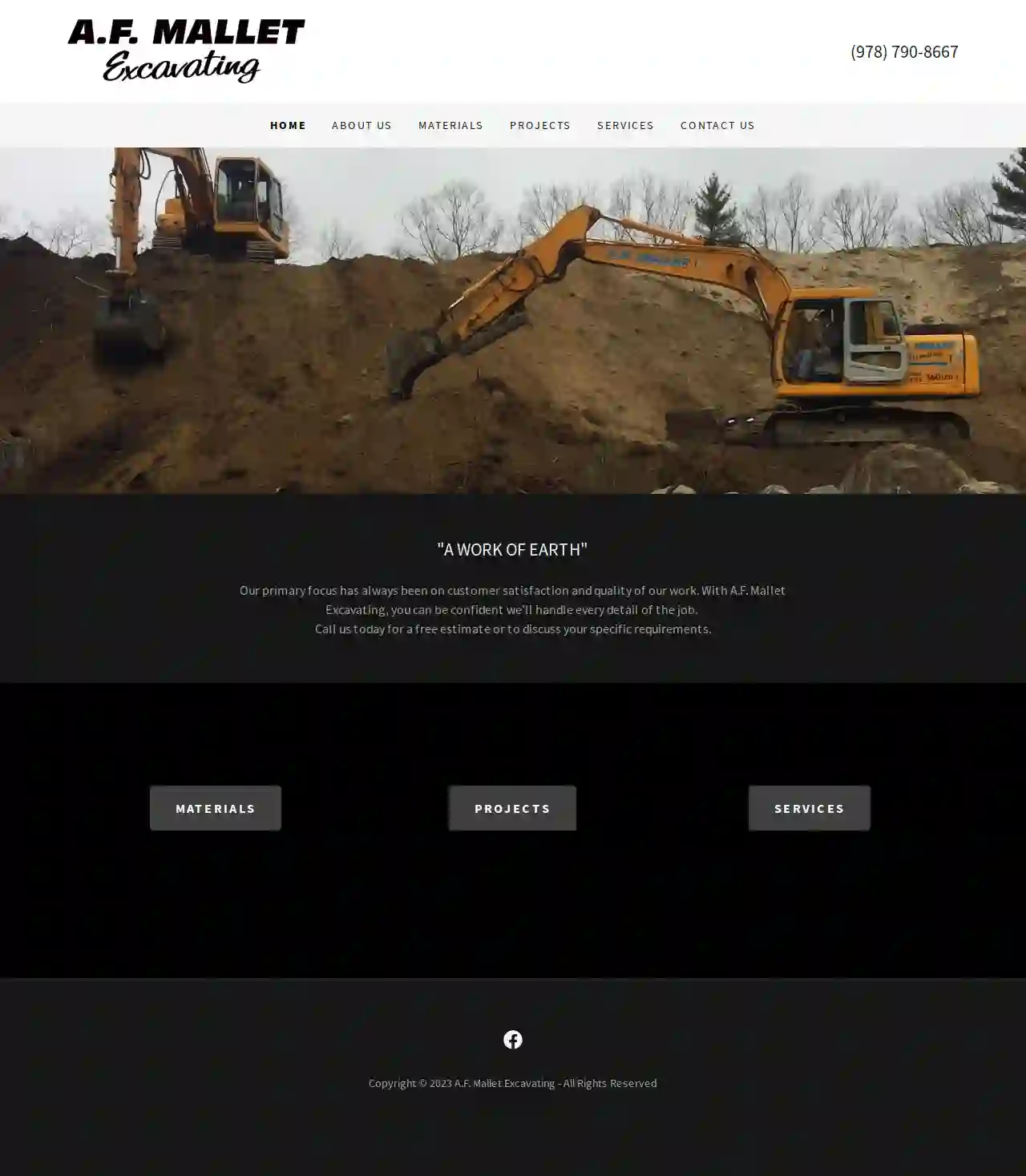
A.F. Mallet Excavating
53 reviewsPO Box 393, Athol, 01330, GBA.F. Mallet Excavating: Your Trusted Partner for Excavation and Site Work Founded in 2007 by owner Andrew Mallet, A.F. Mallet Excavating is a locally owned and operated excavation contractor serving Athol, MA and surrounding areas. We specialize in large-scale municipal, commercial, and residential projects, providing a comprehensive range of services to meet your needs. Andrew's passion for excavation began at a young age, and he has dedicated his career to building a successful business that delivers exceptional quality and customer satisfaction. With his extensive experience and a dedicated team, A.F. Mallet Excavating has become a trusted name in the industry. We are committed to providing our clients with the highest level of service and expertise. From initial consultation to project completion, we work closely with you to ensure your vision is realized. Our team is equipped with the latest technology and equipment to handle any project, no matter how complex. Contact us today for a free estimate and let us help you bring your project to life.
- Services
- Why Us?
- Our Team
- Gallery
Get Quote
Over 13,059+ Excavation Pros in our network
Our excavation contractors operate in Torton and surroundings!
ExcavationHQ has curated and vetted the Best Excavation Contractors in and around Torton. Find a top & trustworthy contractor today.
Frequently Asked Questions About Excavation Contractors
- Project Size and Scope: Larger, more complex excavations naturally take longer.
- Soil Conditions: Rocky or challenging soil types can slow down progress.
- Site Accessibility: Limited access might require more time for maneuvering equipment and hauling materials.
- Weather: Inclement weather can cause delays.
- Permitting and Inspections: Waiting for permits or inspections can extend the timeline.
- Utility Locates: Contact your utility companies to mark the locations of underground lines before excavation begins. This is usually a free service.
- Hand Digging: Excavate carefully by hand near marked utility lines to avoid damage.
- Potholing: Digging small test holes to expose and verify utility depths and locations.
- Safe Distances: Maintaining a safe distance between excavation equipment and marked utility lines.
- Vacuum Excavation: Using vacuum excavation techniques to expose utilities without digging, reducing the risk of damage.
What is the difference between cut and fill excavation?
Cut: Involves excavating soil from an area where the existing grade is higher than the desired grade.
Fill: Refers to using the excavated soil ('cut' material) to raise the grade in an area where the existing grade is lower than desired.
This method minimizes the need to import or export soil, reducing costs and environmental impact. It's commonly used for site preparation, road construction, and landscaping.
How long does an excavation project take?
How do you protect utilities during excavation?
What is the difference between topsoil and subsoil?
Topsoil: The uppermost layer, typically rich in organic matter, nutrients, and microorganisms. It's essential for plant growth and is often darker in color.
Subsoil: The layer beneath the topsoil, containing less organic matter and generally denser. It provides support for roots but is less fertile than topsoil.
During excavation, topsoil is often removed and preserved separately for later use in landscaping, while subsoil is typically used for backfilling or other less demanding applications.
What is the difference between cut and fill excavation?
Cut: Involves excavating soil from an area where the existing grade is higher than the desired grade.
Fill: Refers to using the excavated soil ('cut' material) to raise the grade in an area where the existing grade is lower than desired.
This method minimizes the need to import or export soil, reducing costs and environmental impact. It's commonly used for site preparation, road construction, and landscaping.
How long does an excavation project take?
- Project Size and Scope: Larger, more complex excavations naturally take longer.
- Soil Conditions: Rocky or challenging soil types can slow down progress.
- Site Accessibility: Limited access might require more time for maneuvering equipment and hauling materials.
- Weather: Inclement weather can cause delays.
- Permitting and Inspections: Waiting for permits or inspections can extend the timeline.
How do you protect utilities during excavation?
- Utility Locates: Contact your utility companies to mark the locations of underground lines before excavation begins. This is usually a free service.
- Hand Digging: Excavate carefully by hand near marked utility lines to avoid damage.
- Potholing: Digging small test holes to expose and verify utility depths and locations.
- Safe Distances: Maintaining a safe distance between excavation equipment and marked utility lines.
- Vacuum Excavation: Using vacuum excavation techniques to expose utilities without digging, reducing the risk of damage.
What is the difference between topsoil and subsoil?
Topsoil: The uppermost layer, typically rich in organic matter, nutrients, and microorganisms. It's essential for plant growth and is often darker in color.
Subsoil: The layer beneath the topsoil, containing less organic matter and generally denser. It provides support for roots but is less fertile than topsoil.
During excavation, topsoil is often removed and preserved separately for later use in landscaping, while subsoil is typically used for backfilling or other less demanding applications.